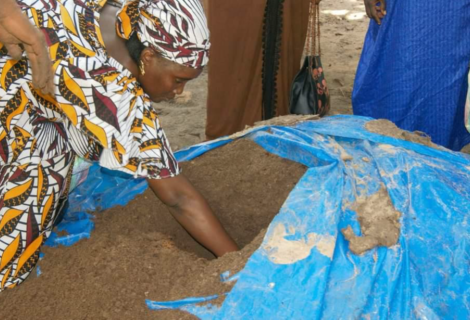
NEXUS BETWEEN WOMEN’S LEADERSHIP AND CLIMATE CHANGE ADAPTATION IN THE GAMBIA- REPORT
NEXUS BETWEEN WOMEN’S LEADERSHIP AND CLIMATE CHANGE ADAPTATION IN THE GAMBIA
This study, commissioned by ActionAid International The Gambia (AAITG), examines the nexus of women’s leadership and climate change (CC) adaptation strategies in Central River Region South and North Bank Region. It aims to highlight the contributions of women leaders, identify the challenges they face, and propose actionable recommendations to strengthen their role in building climate resilience.
The findings underscore the pivotal role women play in informal CC adaptation initiatives, particularly in sectors such as agriculture, forestry, and awareness creation. Accordingly, women leaders have led community-driven efforts such as tree planting, organic fertilizer production, flood prevention measures, and awareness campaigns. These activities have not only mitigated climate impacts but also contributed to community food security and environmental sustainability. However, women’s contributions largely remain unrecognized in formal decision-making processes, limiting their broader influence.
The research also reveals systemic barriers that hinder women’s participation in leadership roles. These include restrictive cultural norms, limited access to education and training, inadequate resources, male-dominated leadership structures, and political marginalization. An inadequate confidence and time constraints due to household responsibilities further exacerbate these challenges. Despite these obstacles, external organizations, including NGOs and government agencies, have played a critical role in empowering women leaders. Interventions such as technical training, funding support, advocacy for gender-sensitive policies, and recognition of women’s efforts have enabled significant progress in CC adaptation in the study areas.
Addressing these barriers requires integrated efforts to align policies and programs with the realities of women’s leadership. Women’s roles in sustainable agriculture, resource conservation, and disaster management highlight their potential to drive transformative change. However, without institutionalized support, these contributions risk remaining localized and underutilized. Policymakers must prioritize women’s access to resources, education, and leadership opportunities to ensure their inclusion in CC adaptation strategies.
THE FULLDOCUMENT ON THE REPORT CAN BE FOUND IN THE DOWNLOADS SECTION BELOW